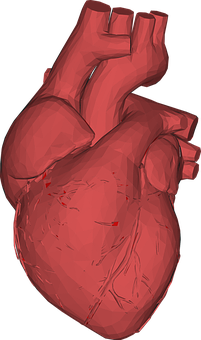
Science and culture today no longer regard death as a metaphysical mystery and certainly not as a source for the meaning of life. For modern people, death is a technical problem that mankind can and should solve.
But how exactly do people die? Medieval fables depicted death as a figure with a black cape and hood holding a large scythe in his hands. In reality, however, people do not die because a darkly clad figure grabs their shoulders or because mortality is an important part of some great cosmic plan. People always die because of some technical malfunction affecting at least one of the 5 vital organs - Heart, Lung, Liver, Kidney, Brain.(1)
Death by Heart Failure

If you ask people how they would like to die most of them say: quickly and painlessly, preferrably a "sudden cardiac death". Not to mention the fact that this way of dying also has its disadvantages (more of them later), only a very small fraction of the cardiovascular can be classified under the term "sudden cardiac death". The vast majority of deaths due to heart failure are caused by a chronic heart insufficiency, caused, among other things, by smoking and diabetes.
We know surprisingly little about this way of dying; however, recent research shows, that the symptoms of patients dying by heart failure resemble those of patients dying from cancer in many cases. In particular, pain and respiratory distress are playing a major role, together with the
extreme fatigue that is caused by a cardiac insufficiency. For most patients this is considered the most stressing symptom and is not easy to soothe unfortunately.
Death by Lung Failure

Here the main symptom is respiratory distress, and the speed of deterioration of the lung function is crucial for the extent of symptom exposure. In case of a rapid respiratory distress high doses of medication are necessary, and the fear for suffocation arising from this symtom can be extremely stressful. Contrary a chronic (and slow) respiratory failure usually leads into a peaceful death during sleep, as the body gets more and more accustomed to high carbon dioxide (CO2) bloodlevels and slides peacefully into a so-called CO2 anaesthesia.
Death by Liver Failure

If the liver (for example, due to tumor metastases) is stopping its function as the detoxification centre of the body, toxic substances such as ammonia and bilirubin (which gives the characteristic yellowing of the skin and eyes
caused by liver patients) accumulating in the blood. These substances have a
supressing effect on the brain, in a way that the patients fall into the so-called hepatic coma in which they usually die peacefully. However, in front of this hepatic coma, phases of confusion and restlessness can occure, that need to be treated accordingly.
Death by Kidney Failure

The kidney also has an important detoxification function for the body and is essential to maintaining the correct ion concentrations (sodium, potassium, calcium, etc.) in the organism. An imbalance of the ions can lead to confusion and seizures, but also to arrhythmia and cardiac arrest. Otherwise, the the course of death is similar to the death of liver liver failure including the final coma.
Death by Brain damage:

The term "brain death" is deliberately not used here, as this term is associated with public discussions about organ transplantation in particular. What we discussing here is a death caused by brain damage, which can be deviced into two groups. First, there are cases of increased brain pressure caused for example by bleeding, tissue swelling after a stroke or by brain metastases. All these effects squeeze the brain in the narrow space of the skull, resulting in loss of its function and thus to death. This type of death is relatively rapid and leads quickly to unconsciousness, but can be accompanied by seizures and pain. The second, increasingly common group is that of patients with dementia and other neurodegenerative diseases, whose progressing brain degenerative processes can go one for years. Finally, the brain is no longer able to correctly control vital functions such as eating and swallowing. Due to the slowness of the process, this usually results in a peaceful death if the dying process is not disturbed by unnecessary medical interventions. Many deaths are a combination of two or more of the above-mentioned forms of death, such as death by lung failure in an advanced stage of Dementia. But it can be helpful to remember that every death is basically based on the severe injury of one or more vital organs (2).
For each technical problem, there may be a technical solution. Many ordinary people who have nothing to do with scientific research now consider death to be a technical problem. The vast majority of researchers, doctors and scientists of unspoken dreams of immortality claim that they are merely trying to solve this or that specific problem. A growing minority of scientists and thinkers are already speaking more openly today about the fact that it is the showpiece of modern science to defeat death and to give people eternal youth. Well-known examples are the gerontologist Aubrey de Grey and the universal scholar and inventor Ray Kurzweil. In 2012 Kurzweil was appointed head of technical development at Google, and a year later Google founded a subcontractor named Calico whose declared goal is "to defeat death" (3). However, this is a topic for a seperate article.
Referenzen
- based on Harari, Homo Deus, C.H. Beck 2017
- based on Borasio, Über das Sterben, C.H. Beck 2011
- www.edition.cnn.com/2013/10/03/tech/innovation/google-calico-aging-death/
I'm split on this issue (solving death).
On one hand, I'd like to live forever for there're so many things I'd like to do and one lifetime is a bit limiting. Also, I'd like to see my loved ones never die.
But...
The way of the world is such that the new generation is taking the place of the older one, filling up their roles and the positions of power and influence.
Imagine being born in a world where exists a class of people that is accumulating capital and power for a thousand years. What are your chances of success? What would your position be? What would the world look like?
As long as we are living in a world with limited resources, and as long as there are human beings starving to death as I type this - solving death is the ultimate hubris.
Looking forward to the next installment. Cheers!
Thank you very much for your comment. I totally agree that this is a complex topic with very mixed (split) opinions also within oneself. As a society we might face the challenge to work out a solution how to deal with the technical possibilities to extend the life of an individuum to a considerable amount, in the next years. Beside the everlasting challenge of mankind how to organize the distribution of limited resources (water, oil, energy, food) this might be an issue of coming across with an overextended resource (lifetime). Problems may not only arise for the society (“class of people accumulating capital and power over a thousand years”) but also for the individuals. Based on the fact that at this very moment, the number of suicides is already higher than the number of victims of violence is pointing in another, but less problematic direction.
You got a 44.98% upvote from @emperorofnaps courtesy of @fragmentarion!
Want to promote your posts too? Send 0.05+ SBD or STEEM to @emperorofnaps to receive a share of a full upvote every 2.4 hours...Then go relax and take a nap!
Congratulations @fragmentarion! You have completed some achievement on Steemit and have been rewarded with new badge(s) :
Click on any badge to view your own Board of Honor on SteemitBoard.
To support your work, I also upvoted your post!
For more information about SteemitBoard, click here
If you no longer want to receive notifications, reply to this comment with the word
STOP